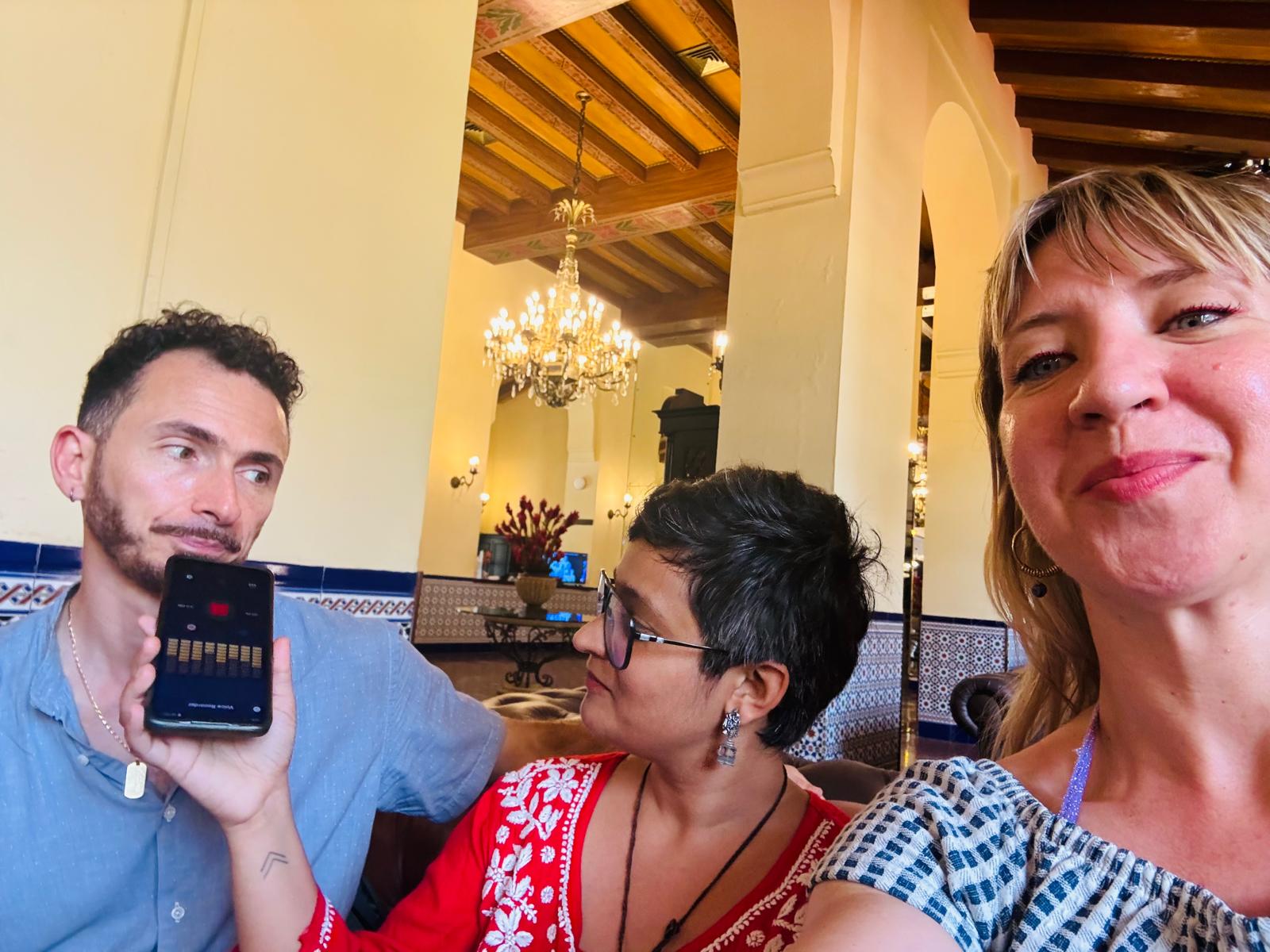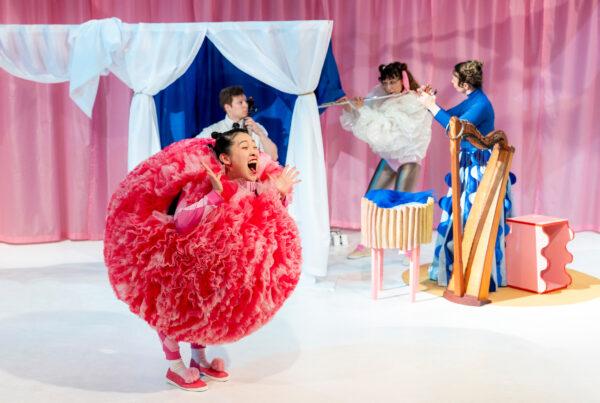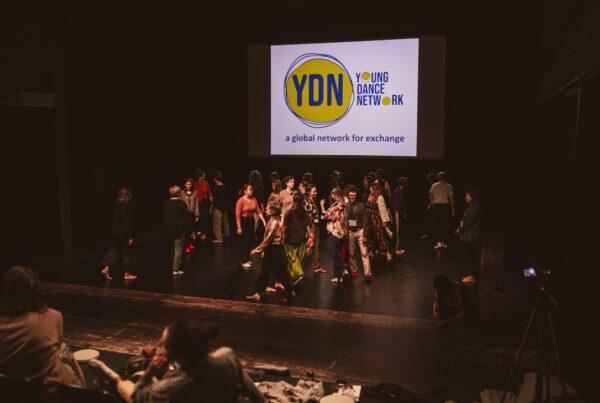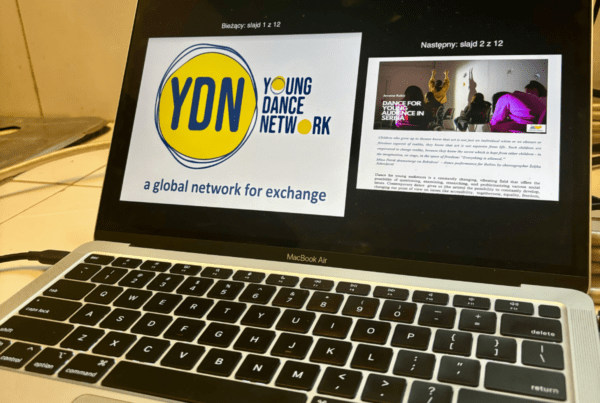“We all have bodies, so we all can dance!” say Sanja Frühwald and Alfredo Zinola from the Young Dance Network. They emphasise the importance of physical interactions and community building, as well as the symbolism of shared humanity beyond professional differences. After 3 days of trying to call and text and chase them around Hotel Nacional de Cuba, while also sitting next to them during the General Assembly, I finally managed to have a quick chat with Sanja and Alfredo about the buzzing activities by the network at the 21st World Congress and Festival in Havana.

Listen to the conversation or read the transcript below:
Transcript:
Nishna Mehta (NM): You can say that on the record now [laughs]
Alfredo Zinola (AZ): Thank you, Ms. Nishna. I too wish to have the time to meet the English mentor, even in a busy time as the regional Congress.
NM: Yes, after three days of trying to find time and coordinate here we are finally, with two of the members of the Young Dance Network at the reception of Hotel Nacional de Cuba and we are with
Sanja Frühwald (SF): My name is Sanja Frühwald mucho, Gousto encantada.
NM: And Alfredo, Alfredo Zinola. So yes, I would like to just talk to you about what has the Young Dance Network been up to at the Congress. Because I see so many of your members around and it’s very exciting to have a big presence of a network. So, if you could just tell us what the network is up to. And if any of your members have had any shows?
SF: Oh, there’s a lot that has been happening in the last week here in Havana. There was a whole set of professional exchange programmes that were of course, in the focus of our work here. Then there was a set of unofficial meetings and exchanges that were happening in between hours or evening hours, and just really meeting people and talking to a lot of them and dancing with a lot of them and sweating with a lot of them, which brings the people together, I think in a very special way. So that’s what we were about. We were bringing people together in a very special way, the physical way. Yeah, and maybe important thing to mention. Besides collaborating with ASSITEJ International and the World Congress, we have been also establishing connections and a new relationship, I would say with Cuban dance scene and professional dancing. They also invited us to participate with the programme in the Festival Transitos, which was hosted by the Retazos Dance Theatre here in old Havana. And they have been hosting most of our programme and adding some extra performances in their festival.
NM: Wow. Would you like to add anything Alfredo or something that really stood out for you? What is the highlight of the Congress for you so far?
AZ: Yeah, well, Sanja said everything. I would say we had the chance this time finally to meet in person, many of us. All the core members except one, that just because she was busy somewhere else. We were able to travel and to find funding to arrive here which is great, great to have this time. And many members also were there. So, then you start really to see the community how, how it grows and who we are. Because yeah, for sure the presence is stronger than just only meetings. I, for me, maybe the most is what actually already Sanja said the fact that the amount of activity [chuckles] that we have delivered. So, we were and we managed to be as a network questioning also, how can we exist for each other to go a bit beyond the just the idea of presenting a performance, although we’re very happy that Cheren Oran One of our members is showing her piece here to find those activities that facilitate more exchange and gives us some more visibility to more of the members in a more, I would say elastic way that feeds maybe the best the Congress.
NM: And Sanja what was the highlight for you at the festival?
SF: Afrobeat dance class I took. [Long pause. Chuckles] But okay, there are some other, there are some my favourite activities were actually getting on the floor with my friends. That was really an unrepeatable experience. We have been spreading cardboard boxes on the floor and taping them with the tape not to scratch our feet on some street. And, and we got it rolling. And that was so nice. It’s also because it gives an opportunity. You know, one thing is to meet people online, to read about them, to Zoom with them, to exchange emails, but when you can smell them and when you can touch them. Alfredo is laughing not everybody stinks in this heat, and you discover that, you know you have this amazing luxury to discover a little bit about people’s practices in a practical manner. Yeah, that was definitely the highlight for me.
NM: Wow, thank you both for this quick chat and your to-the-point answers. There’s one thing I remember Alfredo, you said about sweating together? And I think, yeah, that really is something that as a team or as a network, or as just as a collective is something that you, yeah, you don’t get irritated by anyone else. And you it’s such a human thing to come together. And, and yeah, especially with the weather here, we’re all sweating. So, you know, you go and give someone a hug, and they say, Oh, I’m a little sweaty. I said, Yeah, so am I. So yeah, I really like this idea of, you know, both of us saying that, yes. So we sweat together. And that’s something that really sort of, sort of inspires me about the network.
SF: You know, that there is one thing that we all people, no matter what our profession is having common, here and everywhere, everywhere else, we have a body, and this body when it’s alive, it’s not just sweating, you know, we are breathing, we are sweating, we like the body is just not as a solid thing. We are not rocks we are living organisms. And, and I think this is also something that is in the essence of, of our network. And something that makes us all somehow connected. Beyond profession, I would say, and this is something that was happening here for me very much recognising not just the weather conditions, but in general, the conditions how people here are living. And to be able to be one with them, is something that I don’t know how to say, you know, it’s like it’s such a reality check. Also, you know, it makes a point on that what we are doing, you know, somehow it gives it a bit of a higher sense. I don’t know, like, does it make sense what I’m saying? I don’t know if I’m articulating it clear in English. But yeah, you know, we are somehow all the same. That’s what I wanted to say we are here in Cuba or somewhere in Norway, or somewhere in Asia, we all sweat. And here we were just reminded on that by the amount of sweat that we were sharing with each other and mixing here.
NM: Thank you so much. I think I think I would like to end on that note that I said any last words for people who are listening or reading this interview or post or whatever form this conversation takes.
AZ: Become a member of the Young Dance Network. Since we do all have bodies. [laughs]
SF: It is very easy, youngdancenetwork.com. There is on the homepage a beautiful button on it says join us. So, your opportunity to sweat with us anywhere in the world is just a click away.
—–

Nishna Mehta is an MA in Theatre for Young Audiences. She has been working with and for children and young people from various backgrounds and abilities in India, Singapore, England, Ireland and Germany since 2012.
Currently, she is the Lead Researcher for ASSITEJ International’s Global Advocacy Focused Research Project with a focus on Leadership Demographics in Theatre for Young Audiences, the Chairperson of the International Inclusive Arts Network and acting Secretary of ASSITEJ India.
She wishes to share the magic and joy of theatre with young people across age groups and backgrounds throughout the world and aims to bring her local and international experiences together in order to find a ‘glocal’ identity.






